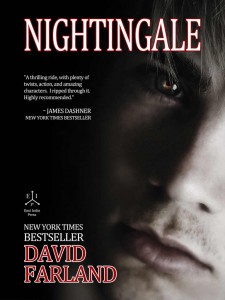Evaluating the Value of Your Movie Option, by David Farland
(From David Farland’s Daily Kick in the Pants—Making the Runelords Movie)
So let’s say that you’ve written a short story or a novel, and a producer comes along and wants to buy your movie option. How much is it worth?
That’s a good question. Right now I’m negotiating a large contract. When I first spoke to one producer, he was surprised that I’d ask for so much for the movie rights to a book (we’re into seven figures). But when I explained the reasoning behind the valuation method, he said, “You’re absolutely right. This property is worth millions—probably more than you’re asking for—, and I’m happy to sign.”
So you, as an author you want as much as you can reasonably get. The producer will of course will want to negotiate as good a deal as he can get. There will almost always be some dickering.
There are a lot of complexities to this, but here are some thoughts. Please note that these method of evaluation a price aren’t cumulative. You choose only one method.
1) In Hollywood, an “idea” for a motion picture is worth a minimum of about $25,000. I know this because a few years ago I met a writer who went to studios and pitched one-line concepts. If the studio liked the concept, “A story about a homeless man who lives under the Statue of Liberty,” they’d pay him $25,000. Now, this was eight years ago when I met the pitch artist, so if you adjust for inflation, you might be able to get that raised a bit.
This number gives you a minimum. If you’re a no-name author who just sold a short story, and the producer wants to base a movie on your story idea, but this is going to be a very low-budget production, then this gives you the floor amount for just about any property.
2) Next, you have to consider, how large is your audience? So you’ve got a property—let’s say a book—that has been a nice hit. It’s sold two million copies. Guess what? Those copies put bodies into theater seats. How many? I don’t know exactly, and movie producers will argue on this point. But we do know that a reader who liked a book is very likely to go see the movie. Even if the reader bought the book and never finished it, he’s likely to pay to sit in the theater. And if you’ve got two million readers talking to friends about how great this movie is going to be . . . then you’ve got great word-of-mouth advertisement. Beyond all of this, if your book gets reissued a few months before the movie comes out, with a nice cover showing the movies’ stars, then it generates more sales and turns bookstores and grocery stores and gas stations into advertising venues. So as an author, you should expect to get paid something for the value of your readership. What’ that value? Well, you might get more, but a dollar per reader isn’t a bad guess. So you now have $2,000,000 as a number to look at, if you’ve got two million readers.
3) Let’s say that you don’t have a ginormous audience yet, but you’ve got a fantastic story. One way to settle upon a price is to take your story through the green-lighting process and have it professionally evaluated. This is what I did with the Runelords when the book first came out. We simply hired experts to evaluate what the movie would make if we followed the novel. According to our analysis at the time (2002), we found that we would gross $128 million in domestic box office in the first two weeks. We then had several studios (Warner Brothers, Paramount, and Universal) each run their own analysis. They discovered that we had (purposely) undervalued the property, and each found that we were ten to twenty million too low in our evaluation. With global licensing, DVD sales, and merchandising we were able to show that the first film would bring in revenues in excess of three billion dollars. Now, hiring professionals to do such an evaluation can be expensive (think something around $50,000), but with a large property, it might be worth considering.
4) Another valuation method is based upon the cost of making the film. Let’s say that a movie is going to be a blockbuster, and the studio is spending sixty million to make the film. Normally, a percentage of the budget—two to three percent—is reserved for acquisition rights. So the production company might pay that much, though normally there will be a cap at a certain price—say $750,000.
5) The prospective market size might also play into this. Movies made for television have pretty standard rates that are much lower than those listed above. Depending upon where the movie will show—upon a network channel or a cable channel—, the payment rates are based upon the viewership.
6) All of these numbers sound great, but remember too that there may be other factors that drag the price down. For example, let’s say that you’ve got a poor producer who is trying to make the movie on a shoestring budget. What do you do? There may be other considerations that you can get for your film, such as executive producer credits, or consultant fees, or screenwriting fees.
When negotiating movie rights, a lot of factors affect how much you can reasonably ask for, and I can’t go into all of them here.
In any case, a movie deal will almost always serve as a good advertisement for your work, and that advertising value, with attendant novel sales, can boost your career for years to come. So look for ways to try to put the deal together.
A final note: Currently, I’m getting ready to take my Runelords series to Hollywood. I’ve written what I believe is the best screenplay for a fantasy in many, many years. Worked my tail off. But in order to get the movie made, I’ll need to convince Hollywood that it is worth doing. One way to do that is to simply look at how many people are interested. If you would like to see a great fantasy movie—in line with Lord of the Rings or Harry Potter, please go to my web page at www.runelordsmovie.com and then like it and—this is important—share it on Facebook. We need a couple of million fans right away.
If you do that, I can do the rest.
READ: Nightingale, by David Farland
MORE about David Farland at: http://www.davidfarland.com/





[…] following on your own, but it’s still valuable information. David Farland gives the low-down on evaluating the value of your movie option; and Jason Black shares a writer’s guide to working with freelancers. Speaking of freelancers, […]
[…] following on your own, but it’s still valuable information. David Farland gives the low-down on evaluating the value of your movie option; and Jason Black shares a writer’s guide to working with freelancers. Speaking of freelancers, […]